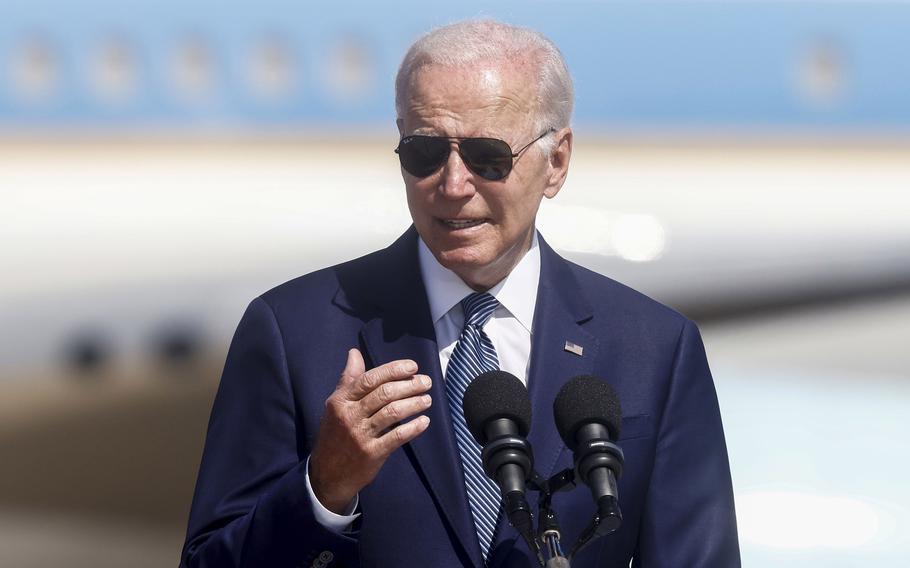
U.S. President Joe Biden, speaks during an arrival ceremony at Ben Gurion International Airport in Tel Aviv, Israel, on July 13, 2022. (Kobi Wolf/Bloomberg)
President Biden issued an executive order Monday intended to boost the domestic biotechnology industry, which encompasses everything from pharmaceutical manufacturing to plastics to innovative fuels, according to White House officials.
Speaking on a background call Sunday, administration officials said the executive order is partly a reaction to competition from China, which they said has a robust development program in biotechnology. The United States needs to safeguard against losing dominance in biotech manufacturing as it did in manufacturing of semiconductor chips, said one of the officials.
"The United States really has the best biotechnology innovators in the world, but we risk falling behind" unless the government helps ensure growth in the sector with targeted investments, including training programs for skilled workers, the official said.
Biden was expected to discuss the executive order during a trip to Boston on Monday, where he was scheduled to outline efforts to fight cancer, which is a particular personal interest of the president.
Biden's son Beau, the former Delaware attorney general, died of brain cancer in 2015 at age 46 and Biden has championed a "cancer moonshot" program since his time as Barack Obama's vice president. Biden was scheduled to deliver his remarks at the John F. Kennedy Presidential Library and Museum. The event is timed to coincide with the 60th anniversary of a 1962 Kennedy speech that touched on his goal of putting a man on the moon.
The White House did not disclose funding levels for the new push, saying a dollar amount would be part of announcements later in the week. Biden is scheduled to host a summit on Wednesday with industry representatives.
A biotechnology initiative was included in a broader science and technology bill that featured $52 billion to subsidize semiconductor chip manufacturing in the United States, which Biden signed into law in August. The United States fell far behind in chip manufacturing and domestic industry has been hobbled by the short supply. The U.S. auto industry is suffering a shortage of cars to sell, for instance, because of a lack of computer chips.
Experts who closely follow China's biotech manufacturing goals say concerted government support is needed to avoid a similar situation with advanced medical and biotech manufacturing. The initiative is not just to boost research and development of drugs, which is already heavily subsidized by the National Institutes of Health and the Department of Defense.
White House officials said it also will target efforts in agriculture feed supplies as well as things like biomass fuels.
A report in July by the Center for a New American Security, a left-leaning, pro-defense think tank, warned of the dangers of falling behind China in biotechnology.
China already dominates global production of active pharmaceutical ingredients for generic drugs. Western nations continue to lead in biotechnology, but the United States needs to "focus on improving access to equipment at the core of the bio revolution: computing and data sources used in genomics, and hard infrastructure used in DNA synthesis and fermentation," the CNAS report said.